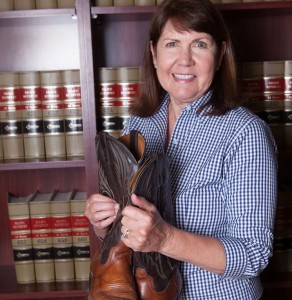Ann Kirkpatrick Is on the Hunt For John McCain — Well, His U.S. Senate Seat, At Least
If there’s one thing Ann Kirkpatrick doesn’t want to talk about, it’s John McCain.
On a recent Thursday afternoon, the congresswoman is seated at a long wooden table in a boardroom in Tucson. She’s just finished a round-table discussion with 20 men and women who work with veterans, and managed to go the entire hour without anyone mentioning the five-time Senate incumbent she’s trying to unseat this November.
And now, as she rests her forearms on the table and answers a question about her life before politics, she looks almost excited, as if she’s gotten away with something.
She tucks her shoulder-length brown hair behind her ears, revealing a pair of silver and turquoise earrings, and smiles, waiting for the next question.
“What’s it like to run against John McCain?” she’s asked.
“Well, I think more about it like I’m running for Arizona,” she replies, not missing a beat. “I’ve seen Arizona go through too many boom-and-bust cycles over my lifetime, and so my work and my vision for Arizona is really about building a strong, diverse, stable economy.”
She makes eye contact with the journalist across the table. Smiles again. This isn’t her first rodeo.
Asked whether she’s running a pro-Ann Kirkpatrick campaign or an anti-John McCain campaign — given that her TV ads, daily e-mails, and tweets always target the incumbent — she demurs, changing the subject.
“I’m running on the vision that I have for Arizona. That’s what drives me; that’s what my work is about,” she answers, glancing quickly at the smiling campaign staffer also sitting at the table. “And look, I’m out all over the state, and unemployment is still really high in the tribal and rural areas. This is still about jobs; it’s really about jobs.”
When pressed about the campaign message, Kirkpatrick doesn’t squirm in her seat or fidget, but the corners of her smile do droop just slightly, as if she’s either annoyed by the question — or bored.
Given the opportunity, Kirkpatrick prefers to talk about the challenges facing working-class families and veterans or bolstering Arizona’s infrastructure. She’ll talk your ear off about water policy or the problems with mining uranium in the Grand Canyon. And having grown up in rural Arizona on the White Mountain Apache Reservation, she has plenty to say about local and national policies that affect farmers, loggers, and tribes.
But a few minutes later, while talking about the things she’s been hearing from people on the campaign trail — their fears about the cost of education or their struggles to access their VA benefits — she slips up.
“[People] are very concerned about the vicious, hateful, racist, insulting things that Donald Trump has said, and they want somebody who will stand up to Trump. And I hear from a lot of people who don’t think that’s John McCain,” she says. “I mean, Trump insulted John McCain, and he hasn’t stood up to him.”
With that, she pivots and begins talking about a recent round-table event she had with Latino business leaders and the importance of supporting entrepreneurship.
Ann Kirkpatrick might not want to talk about John McCain, but even she can’t help it. (Continue reading at the Phoenix New Times.)









